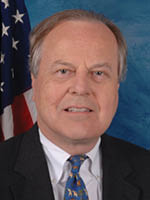Heroes on the Hill: Representatives Diana DeGette and Ed Whitfield

JDRF has seen tremendous legislative and regulatory victories in recent years on behalf of the millions of people living with type 1 diabetes (T1D). And in a political environment crowded with other important issues and a strained fiscal climate, all of those victories were hard won. JDRF has its champions in Congress to thank for their work in helping us to cross the finish line. In particular, the co-chairs of the Senate and Congressional Diabetes Caucuses have spearheaded efforts that have resulted in unprecedented support among their colleagues for the T1D community. Their efforts have helped us achieve some critical goals. These achievements bring us closer to providing better treatments, prevention, and ultimately a cure for T1D.
In this article, we focus on the Congressional Diabetes Caucus co-chairs, two of JDRF’s biggest champions: Representative Diana DeGette of Colorado and Representative Ed Whitfield of Kentucky. Though they come to their common cause from different political parties—Ms. DeGette is a Democrat, and Mr. Whitfield is a Republican—these two veteran legislators have proven time and again that improving lives is not a partisan issue.
 Representative Diana DeGette
Representative Diana DeGette
Now in her ninth term in the House of Representatives, Congresswoman Diana DeGette has represented the first Congressional district of Colorado since 1997 and has served as chief deputy whip since 2005. As a leading voice on the Committee on Energy and Commerce, which has jurisdiction over healthcare issues, she has a proven commitment to improving public health.
Co-chairing the Congressional Diabetes Caucus requires strong leadership—with more than 200 members, it is the largest caucus in Congress. For Ms. DeGette, commitment to the caucus is not just a professional matter—it’s a personal one. In 1999, her four-year-old daughter, Francesca Lipinsky, was diagnosed with T1D. “Having raised a daughter with type 1 diabetes, I found myself in a unique position as a mother and a lawmaker. I was able to grasp the realities involved in treating diabetes, the challenges individuals and families face, and at the same time had the ability to create and garner support for sound legislation,” says Ms. DeGette. “This combination provided me with a great opportunity to strengthen and improve public policy.”
One of Ms. DeGette’s most far-reaching contributions has been her commitment to spreading awareness about T1D among her colleagues in Congress. She has worked directly with JDRF to provide T1D educational forums in the House for her colleagues to learn from T1D researchers about the disease and the daily burden of managing it. “I have worked tirelessly during my time in Congress to generate awareness of type 1 diabetes among my colleagues and to secure the necessary support for key legislation focused on improving diabetes research and treatment,” says Ms. DeGette.
She has also played a leadership role in some of the Congressional Diabetes Caucus’ most significant legislative achievements, including securing Medicare coverage for blood-glucose test strips, continuous glucose monitors, insulin infusion pumps, and diabetes self-management training. Each of these steps forward has broadened access to essential diabetes management tools among underserved populations. Taken together, they have greatly improved T1D management for millions.
In 2011, Congresswoman DeGette needed to recruit a new co-chair for the Congressional Diabetes Caucus to replace the previous co-chair, former Representative Mike Castle, of Delaware, who retired in 2010. She approached Congressman Whitfield, who enthusiastically took up the mantle. Together, they have brought some of the T1D community’s most important issues to center stage and gathered the bipartisan support necessary to make them successful. Read on to learn more about those victories.
 Representative Ed Whitfield
Representative Ed Whitfield
Representative Ed Whitfield knew very little about T1D until he met Parker Shadoan. In his near 20 years in Congress, Mr. Whitfield has met with many of his constituents, but this meeting with Parker, a teenager from Paducah, KY, made a singularly lasting impression. In particular, he was impressed by how recent advancements in T1D treatment had improved Parker’s life, and lessened the burden of the disease on both Parker and his family.
“I must say I was shocked to learn of the day-to-day challenges children and young adults like Parker face living with type 1 diabetes. Parker’s ability to overcome his health issues and live a healthy, normal lifestyle is truly an inspiration. It’s my hope that through continued research and clinical trials we can make the lives of those living with type 1 diabetes even better.”
In close partnership, Congressman Whitfield and Congresswoman DeGette were instrumental in two key victories over the last two years: first, JDRF’s effort to work with the U.S. Food and Drug Administration (FDA) to issue the crucial regulatory guidance needed to move artificial pancreas systems into the final phases of clinical testing; and second, the renewal of the Special Diabetes Program.
In the spring of 2011, the two representatives led a letter to FDA Commissioner Margaret Hamburg. The letter demonstrated support for the next steps in the regulatory process toward development of artificial pancreas systems; cited the technology’s potential to change the lives of the millions of people with diabetes across the country; and urged the agency to follow the suggestions put forth by JDRF and the clinical community. Representatives Whitfield and DeGette gathered signatures from no less than 245 of their House colleagues, and seven others followed with their own individual letters of support. By December 2011, the FDA had delivered draft guidance for human clinical trials and marketing of artificial pancreas systems, and in November 2012, the agency issued final guidance, a key step in advancing this technology for market approval.
In the spring of 2012, Representatives Whitfield and DeGette came together again and led another bipartisan letter—this one to House Speaker John Boehner and Democratic Leader Nancy Pelosi—recognizing the contributions of the Special Diabetes Program (SDP). This letter received 268 signatures, and was followed by individual letters from four of their House colleagues. On January 1, 2013, the SDP was renewed as part of the fiscal cliff agreement, the American Taxpayer Relief Act of 2012. Thanks to strong bipartisan support in Congress, this critical federal program has provided nearly $2.04 billion to date to the National Institutes of Health for T1D research.
The significance of the goals that Representatives DeGette and Whitfield have helped make reality cannot be understated—but they don’t plan to stop now. They are hard at work in the 113th Congress. With JDRF’s encouragement, they are recruiting their colleagues for the Congressional Diabetes Caucus, in order to build substantial support for diabetes programs and patient care, and they continue to increase diabetes awareness. JDRF won’t stop until there is a cure for T1D—and these two Congressional heroes are right there with us.